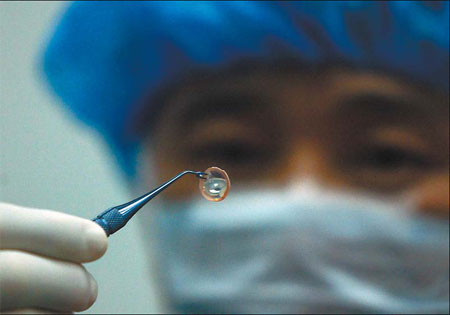China launched a national organ donation system yesterday in a bid to gradually shake off its long-time dependence on executed prisoners as a major source of organs for transplants and as part of efforts to crack down on organ trafficking.
The system, operated mainly by the Red Cross Society of China with assistance from the Ministry of Health, will begin as pilot projects in 10 provinces and cities.
 |
|
A cornea for transplant is collected from a deceased organ donor in Badong Hospital, Hubei province, in this file photo. [China Daily]
|
"The system is in the public interest and will benefit patients regardless of social status and wealth in terms of fairness in organ allocation and better procurement," said Vice-Minister of Health Huang Jiefu.
Under the system, the Red Cross is responsible for encouraging post-death organ donations among the public, receiving donor registrations, keeping a database, starting a fund to provide financial assistance for needy, surviving families of donors and overseeing the allocation of donated organs according to set principles.
"Transplants should not be a privilege for the rich," Huang said.
The late, famous Chinese actor Fu Biao received two liver transplants within several months in 2005, raising doubts about the fairness of organ allocation, given that the waiting time for the general public can be years - even if one is lucky enough to get a match, let alone have a second surgery.
Currently about one million people in China need organ transplants each year while only 1 percent receive one, official statistics show.
Only about 130 people on the mainland have signed up to donate their organs since 2003, according to research on the promotion of organ donation after death by professor Chen Zhonghua with the Institute of Organ Transplantation of Tongji Hospital.
The system will help find more willing donors who didn't know how to donate, said Jiang Yiman, the society's deputy director at the launch yesterday in Shanghai. "The Chinese have a tradition of helping others in need and the potential of organ donations from the public is yet to be tapped," she said.
Organ donors
Executed prisoners, who experts estimate account for more than 65 percent of total donors, "are definitely not a proper source for organ transplants," said Vice-Minister Huang. That the rights of death-row prisoners to donate is fully respected and written consent from them is required, he told China Daily.
Qian Jianmin, chief transplant surgeon with the Shanghai Huashan Hospital, said hospitals performing transplants not only treat patients getting organs from executed prisoners, but have to deal with other levels of government, including the justice department.
"Corruption can arise during the process," he said.
Some just ignore legal procedures regarding organ donations from executed prisoners and make a fat profit, Huang said.
All costs are passed on to patients. Sometimes the recipient pays up to 200,000 yuan (US$29,000) for a kidney, not including other medical services.